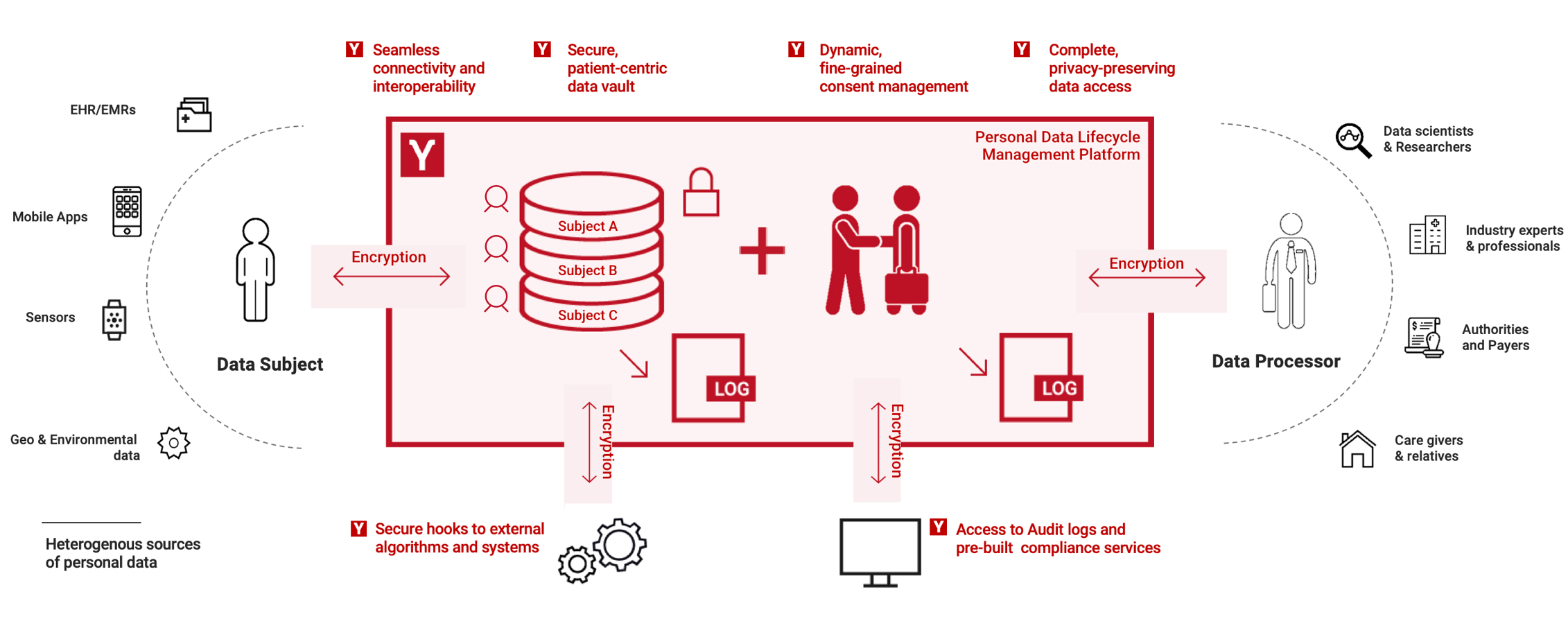open-pryv.io
Open Pryv.io

Personal Data & Privacy Management Software
A ready-to-use solution for personal data and consent management.
Pryv.io is a solid foundation on which you build your own digital health solution, so you can collect, store, share and rightfully use personal data.
Maintained and developed by Pryv.

Digital Public Good
 Open-Pryv.io is recognized as a digital public good by DPGAlliance a UN-endorsed initiative that facilitates the discovery and deployment of open-source technologies.
Open-Pryv.io is recognized as a digital public good by DPGAlliance a UN-endorsed initiative that facilitates the discovery and deployment of open-source technologies.
Features
- Provides latest Pryv.io core system ready for production
- User registration and authentication
- Granular consent-based access control rights
- Data model made for privacy, aggregation and sharing Data in Pryv
- Full data life-cycle: collect - store - change - delete
- REST & Socket.io API
- Ease of software integration and configuration
- Seamless connectivity and interoperability
Documentation
- API Documentation & Guides: pryv.github.io
- Support: https://github.com/orgs/pryv/discussions
- More information about Pryv : Pryv Home
Summary
- Choose your setup
- Download the required files / Run the installation scripts
- Edit the configuration files
- Start the services
- Try the API
- Customize your platform
Setup
Pryv.io is designed to be exposed by a third party SSL termination such as NGINX.
Choose your Set-up
- Discover Open Pryv.io on your local environment, this will only allow localhost apps to connect to your platform.
- Download docker images without SSL (quick start)
- Download docker images with SSL
- Native installation
- Launch Pryv.io on a server exposed to the Internet with built-in SSL, this requires to have a hostname pointing to the public IP of your server.
- Download docker images (quick start)
- Native installation
- Launch Pryv.io on a server with an external SSL termination. You know what you are doing.
- Download docker images
- Native installation
Docker
The dockerized versions and their instructions are available at this link: Download link.
If you wish to build the images yourself, refer to the following README: docker/README-build.md.
Once it is running, you can continue with the tutorials.
Native
Prerequisites:
- Node v18.14.2 Node.js home page
The installation script has been tested on Linux Ubuntu 18.04 LTS and MacOSX.
npm run setup-dev-envto setup local file structurenpm installto install node modules
Native setup with no SSL
Each service independently - logs will be displayed on the console
npm run databasestart mongodb or start ferretDBnpm run apistart the API server on port 3000 (default)npm run mailstart the mail service
Local native setup with backloop.dev loopback SSL
backloop.dev certificates facilitate local developpment by enabling https on localhost.
npm run databaseto start mongodb or start ferretDB- (optional)
npm run mailstart the mail service npm run apibackloopto start api server usingconfigs/api-backloop.yml
You can now access you API from you own computer with SSL on
https://my-computer.backloop.dev:4443
You can check by opening https://my-computer.backloop.dev:4443/reg/service/info
And create new users or access token from the Pryv Access Token Generation Page
Native setup with custom SSL
- Edit
http:sslpart in./configs/api.ymlfile to point to your certificates an key files. - Update
dnsLess:publicUrlin./configs/api.ymlto match - Run
npm run pryvto start the API
Config
For the native installation, edit ./configs/api.yml
dnsLess:
publicUrl: http://localhost:3000
http:
port: 3000
ip: 127.0.0.1
auth:
adminAccessKey: REPLACE_ME
trustedApps: "*@https://pryv.github.io*, *@https://*.rec.la*, *@https://*.backloop.dev*"
eventFiles:
attachmentsDirPath: var-pryv/attachment-files
service:
name: Open-Pryv.io
support: https://pryv.com/open-pryv-non-configured-page/
terms: https://pryv.com/open-pryv-non-configured-page/
home: https://pryv.com/open-pryv-non-configured-page/
eventTypes: https://pryv.github.io/event-types/flat.json
services:
email:
enabled:
welcome: true
resetPassword: true
- publicUrl Is the “Public” URL to reach the service, usually exposed in https by a third party SSL service such as NGNIX.
- http
- port The local port to listen
- ip The IP adress to use. Keep it 127.0.0.1 unless you explicitely want to expose the service in
httpto another network.
- auth
- adminAccesskey key to use for system calls such as
/reg/admin/users. A random key should be generated on setup. - trustedApps list of web apps that can be trusted-app functionalities API for trusted apps: API reference see: SETUP Guide - customize authentication
- adminAccesskey key to use for system calls such as
- service API documentation on Service Information
- services:email see Options & Customization below
Start
At this moment you should have your application running on the public URL you defined.
- Create an account and launch the authentication process on App-Web-Access: https://pryv.github.io/app-web-access/?pryvServiceInfoUrl=https://my-computer.backloop.dev:4443/reg/service/info.
- The service info URL to your platform is: https://my-computer.backloop.dev:4443/reg/service/info
If you are using another public URL, replace https://my-computer.backloop.dev:4443 by it in the link above.
Design your Data Model
Data in Pryv is stored in streams and events. We provide you with all necessary information to design your own data model in our Data Modelling Guide through a broad range of use cases and scenarios you might encounter.
Try the API
After this process, you should have an account on your Open Pryv.io platform with a valid authorization token in the form of an API endpoint, you can try various API requests using Postman following this guide https://pryv.github.io/open-api/.
You can also try our example apps with guides and tutorials.
Options & Customization
From version 1.9.2 OpenPryv.io supports Full MongoDB/FerretDB
Read README-DBs for more information.
Authentication & Registration web app.
Open Pryv.io comes packaged with app-web-auth3, the default web pages for app authentication, user registration and password reset.
During the set-up process it has been built and published in public_html/access/. To customize it, refer to its README in app-web-auth3/.
To use a new build, simply copy the contents of the generated files from app-web-auth3/dist/ to public_html/access/
Event types
Open Pryv.io comes with default event types.
The default ones are fetched at boot from the URL defined in service:eventTypes in the .yml config file, set to https://pryv.github.io/event-types/flat.json.
To customize your own, clone the Data Types repository and follow the guide there.
MongoDB data folder
By default the MongoDB data are stored in var-pryv/mongodb-data. If you want to modify the folder where the MongoDB data files are stored, read ferretDB README.
FerretDB data folder
By default the FerretDB data are stored in var-pryv/ferretdb-data. If you want to modify the folder where the FerretDB data files are stored, you can modify in scripts/setup-mongodb the variable MONGO_DATA_FOLDER.
Visual assets and icons
Your platforms visuals can be customized in public_html/assets/, please refer to the README inside. These assets are a clone of the assets-open-pryv.io.
E-Mails
Pryv.io can send e-mails at registration and password reset request.
The emails can be sent either by local sendmail (default) or SMTP.
This service, its documentation and mail templates can be found in service-mail/.
Backup
Prerequisites:
- rsync
To make a backup of your data:
Backup: native
Run ./scripts/backup-database-native ${BACKUP_FOLDER} to generate a dump of the current database contents
Run ./scripts/backup-usersfiles-native ${BACKUP_FOLDER} to copy the current usersfiles files.
To restore the database, run ./scripts/restore-database-native ${BACKUP_FOLDER} to restore data from the provided backup folder.
To restore attachments, run ./scripts/restore-usersfiles-native ${BACKUP_FOLDER} to restore data from the provided backup folder.
Depending on your setup, you may need additional access rights.
Backup: dockerized
Follow the guide in the docker package.
Contributing
Contributions are welcome. Get in touch with the Pryv team or submit a PR with your changes or adaptation.